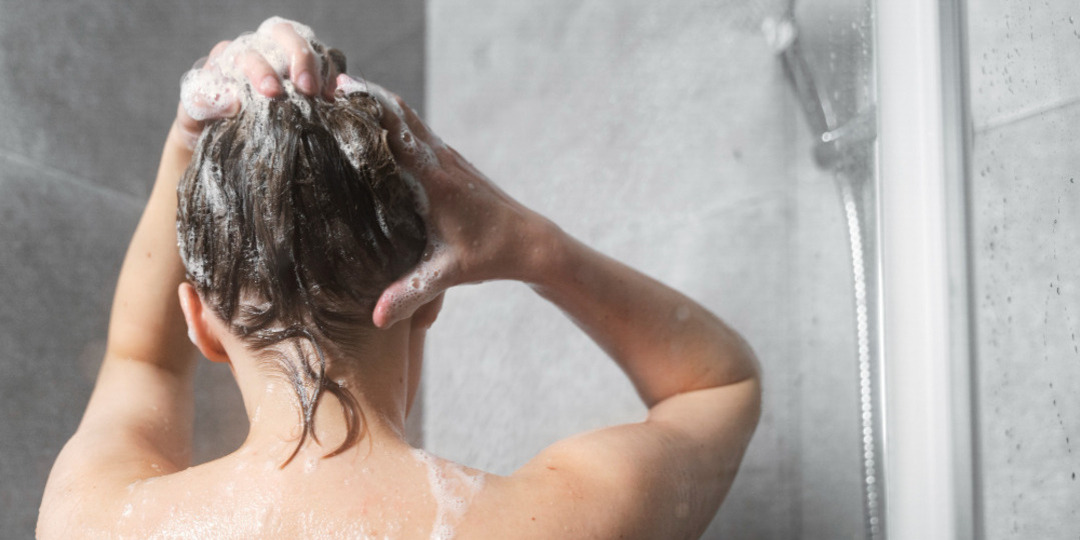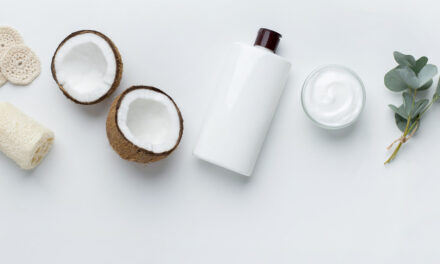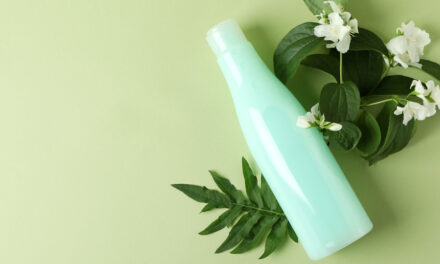
Our sebaceous glands produce the much needed sebum to protect our skin from becoming dry. While sebaceous glands are all over the body, they’re concentrated more on our face and scalp hence the issues related to oily scalp or skin. The good news is you can combat oily scalp using homemade shampoos that include ingredients to reduce sebum production naturally.
So, let’s get started with learning more about greasy hair and then how to combat it. Shall we?
Understanding Oily Hair
When excess sebum is produced by sebaceous glands, it leads to oily hair or greasy hair. It’s more than just hair looking oily, as you all probably know. It makes hair look limp, dirty and lifeless. With an active social life we all have these days, it’s a problem. Is it not?
Why exactly do we have oily hair? How to protect hair health while combating the issue? You probably have these questions and more, which we will try to answer in this post as much as we can.
Oily hair can be due to several reasons – hormonal imbalance, hyperactive sebaceous glands, diet and lifestyle choices, frequent hair washing, certain health conditions or prescription drugs, certain chemicals in hair care products, excessive rubbing of scalp, etc.
Excess oil can also lead to other issues like dandruff, stunted hair growth and whatnot. It’s best to deal with it swiftly and safely. We suggest using homemade shampoo designed to combat excess oil for welcome relief and curbing the issue.
Benefits of Homemade Shampoo to Combat Oily Hair

There are many benefits to preparing your own natural shampoos for hair and scalp care. Let’s take a look at a few:
- They’re natural – which means no harsh chemicals or unknown ingredients or damaging ingredients.
- They’re also eco-friendly, which is a bonus and we can do our bit towards protecting our planet.
- Though there are many options, you can choose the shampoo recipe you like and customize it to suit your requirements and preferences better – your very own diy shampoo.
- You can prepare larger or smaller batches, though smaller batches are ideal to keep them microbe free and fresh.
- Diy shampoo is pocket friendly compared to store-bought commercial shampoos.
- Not only does natural homemade shampoo combat oily hair, it also helps promote healthy hair and scalp.
DIY Shampoo Recipes for Oily Hair
Frequently washing the hair can be counterproductive – it will leave hair dry and in turn, sebaceous glands produce more sebum. That’s a vicious cycle. On the contrary, solving the problem – excess sebum production using natural ingredients can not only help temporarily but also to prevent the problem of oily hair.
That’s where our diy shampoo for oily hair comes into play. We’re going to prepare our very own homemade natural shampoo with ingredients that help regulate the scalp’s sebum levels. So, shall we get started?
DIY Vegan Clay Shampoo
Here we’re using clay to combat greasiness while also coming up with a nourishing, clarifying and cleansing shampoo that’s gentle and won’t send your sebaceous glands into overdrive.
Ingredients
Liquid Castile Soap – 1/4 Cup
Green Tea – 1/2 Cup
French Green Clay – 1 Tbsp.
Vegetable Glycerin – 1 Tbsp.
ACV – 2 Tbsps.
Tea Tree Oil – a few drops
Instructions
Brew a strong green tea with a spoon or more of green tea leaves and set aside to cool.
In a mixing bowl add all the ingredients and whisk gently to combine well.
Done!
Transfer to a sterlied shampoo bottle and use as needed.
How to Use?
Use like you would your conventional shampoos.
Take enough on your palm after wetting your hair and add some water (if needed) before applying on your hair – this helps spread out the shampoo easily and more evenly. Gives more out of your shampoo and makes it more pocket-friendly.
Apply on your hair and scalp massaging your way through your tresses and scalp.
Wait for a minute before rinsing off.
Finish off with a pH regulating rinse like apple cider vinegar rinse.
Notes
Shake the bottle before every use.
The antimicrobial properties of tea tree oil will keep scalp issues at bay, besides regulating scalp’s oil levels. You can use any essential oil that is known for regulating sebum levels.
You can use any clay you have access to – make sure they’re not too drying. Kaolin clay and French green clay are mild and can be used even for those with sensitive skin.
You can use honey instead of vegetable glycerin if you’re not looking for vegan options.
Vegan Aloe Shampoo
Nourishing and light, aloe gel is a wonderful ingredient for overall hair and skin care. We’re going to prepare a moisturizing and light shampoo using this wonderful ingredient. You can also opt for the no-poo version of this recipe.
Ingredients
Aloe Juice – 1/4 Cup
Liquid Castile Soap – 1/4 Cup
Distilled Water – 1/4 Cup
Lavender Essential Oil – 7 Drops
Lemon Essential Oil – 7 Drops
Instructions
Add all the ingredients to a mixing bowl and whisk to combine.
Done!
Transfer to a sterilized shampoo bottle and use as needed.
How to Use?
Use like you would your normal shampoo – apply on your hair and scalp.
Massage for a few seconds.
Wait for a minute before rinsing off.
Notes
You can skip the castile soap for a no-poo version of the shampoo – aloe is a gentle cleanser and can cleanse your scalp all on its own.
Finish off with a baking soda rinse to clarify your scalp and restore the scalp’s pH levels.
Tips for Maintaining Healthy Oily Hair

Don’t wash your hair too frequently. A good hair care routine involves washing your hair twice and no more than thrice a week.
Don’t rub your hair too much while toweling it dry. Try the patting motion to dry your hair.
It sounds stupid – but keeping your hands in your scalp too often isn’t good – gliding your hands through your scalp could be a nervous habit but it could be sending your sebaceous glands into overdrive. While massaging is good, prodding your scalp throughout the day or night isn’t helping your cause.
Use ingredients that help combat excess sebum production like tea tree oil, baking soda, apple cider vinegar, green tea, aloe vera, etc. in your homemade shampoo.
Prepare your own shampoo whenever you can and give normal shampoo bought from the store a miss.
Avoid using harsh chemicals and curb styling treatments and products.
Use dry shampoo if needed to add a day or two between washes.
While combating excess sebum production, don’t skip out on moisturization. Use oil-free ingredients over store bought moisturizers like aloe vera or vegetable glycerin and even honey to help keep your hair moisturized and hydrated.
Conclusion
Do give these recipes a try and let us know how you liked it. All these recipes are natural and really help combat excess sebum naturally. Don’t have time for DIY recipes? We’ve got you covered with a broad range of premium vegan hair care cosmetics from Vitamin Revive.
Do check out their online store to know more about their products. If you have any questions or queries, feel free to reach out to us.
We love hearing from you. As always, do give these recipes a try – add your own twist to them and make them yours. There’s no fun in DIYing without the experimentation and trying out different mini versions of a recipe.
Isn’t it? Experiment and have fun with DIYing while also restoring your hair and scalp health!
FAQs
How do you make homemade oily hair shampoo?
You can make your homemade shampoos from scratch or using a base like we’ve done. We’ve kept our recipes newbie friendly by using a base – liquid castile soap.
What’s the best natural shampoo for oily hair?
There are different options when you’re considering a natural shampoo for oily hair. Different recipes work differently for individuals. You can choose the ingredients or recipes that work best for you. A rule of the thumb is to use ingredients that combat excess oil levels while also being suitable for your hair and scalp type.
What shampoo ingredient is good for oily hair?
There are many good ingredients to choose from. A few include tea tree oil, lemon juice, essential oils, apple cider vinegar, tea, baking soda, etc.
Can we use coconut oil or olive oil in the shampoos?
Yes, you can’t skip oils because you have oily hair. You still use them in moderation. You can also use lighter oils like sweet almond oil, argan oil, etc. Olive oil is extremely moisturizing and can help retain moisture.
Can I use Coconut Milk to moisturize my hair?
Yes, rich in essential fatty acids and nutrients, coconut milk is a great way to nourish and moisturize your hair. It’s also lighter than coconut oil and leaves you with soft and shiny hair. However, use it once a week for best results.









